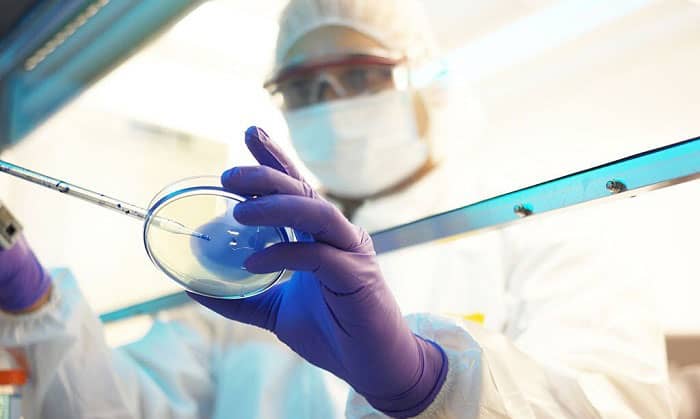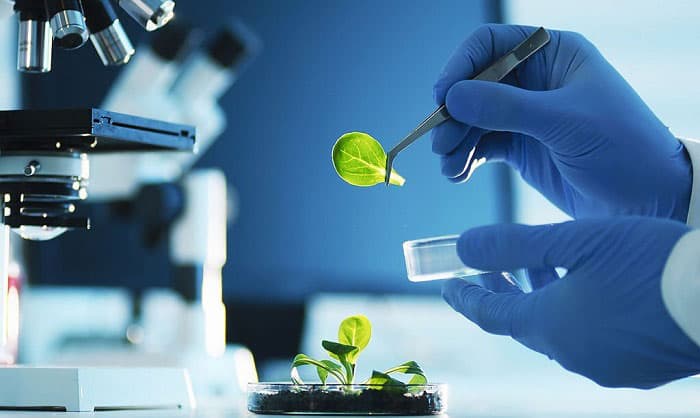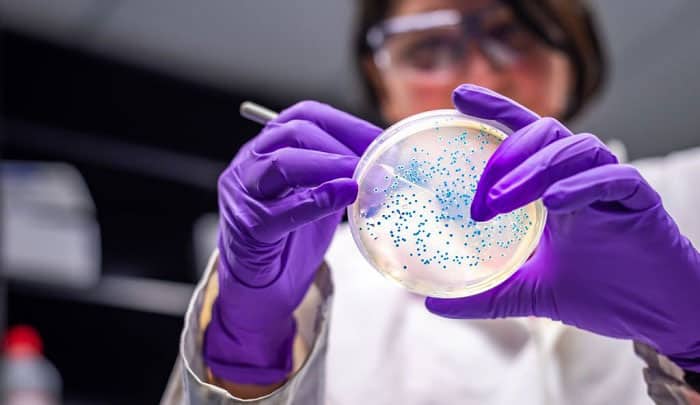While working in science laboratories, we have to abide by many regulations. Among those are requirements for suitable types of gloves.
So, why should you wear gloves in a science lab?
First of all, we cannot afford to get hurt by hazardous chemicals in the science lab. Furthermore, we should protect our working project by not accidentally contaminating anything with our highly likely dirty fingers.
Read on to know more about laboratory glove use.
Table of Contents
Reasons to Wear Science Lab Safety Gloves
1. Lab gloves protect your skin
There are many types of hazards that can harm you while preparing, conducting, or monitoring experiments in laboratories. And with a qualifying pair of safety laboratory gloves, you can avoid being hurt by the following factors:
- Chemical and thermal burns – We wear heat and chemical-resistant gloves to shield against corrosive and flammable substances.
- Many, both organic and inorganic chemicals, can do such harm. And they might accidentally splash or get spilled when you are handling them, which can hurt your hands badly if you do without the protective pair of gloves.
- Absorption of chemicals – Many chemicals do not have a burning or corrosive effect right away on our skin. But prolonged exposure to them might affect our health in the long term.
- When those substances are absorbed through our skin, day after day due to direct contact, allergy symptoms might appear. In the end, it can result in a chronic skin condition.
- Therefore, we need qualifying gloves for chemical lab to deal with any type of substance prevalent at our workplace.
- Eye irritation – What do gloves uses and function have to do with your eyes, you might ask. If you touch the chemicals with your hands and accidentally bring them to your eyes, it will surely hurt.
- So, wearing gloves also protects your eyes and other parts of your skin that you put your hands onto after tasks.
- Skin abrasion and cuts – Cut and puncture-resistant gloves used in laboratory ensure we do not get hurt by sharp equipment.
- It can happen when we clean the tools before and after the experiments. Also, when glass equipment, like the thermometer, suddenly breaks, you do not want to get hurt due to its shards.
2. Laboratory gloves prevent contamination
When handling laboratory equipment or substances, we do not want to leave stains, like dirt, fingertips, or skin oils on them. Therefore, it is a must to wear disposable gloves for work in the lab and not handle anything important or sensitive with a bare hand.
What Gloves Should You Wear for a Science Lab?
If we want to choose gloves wisely, there are several things to consider. Those factors include:
- The level of hazards, especially the corrosive and flammable chemicals of your laboratory
- Testing and safety standards for the lab gloves
One easy method to check if the function of gloves suits your work requirements is by looking at their materials:
- Nitrile gloves for chemistry lab can resist corrosive substances, including caustics, chlorinated solvents, acids, bases, etc.
- Furthermore, they can offer good dexterity to handle laboratory equipment. And they can protect you from punctures when working with pointy tools.
- Neoprene gloves are also sufficient chemical-resistant handwear as they shield against bases, acids, phenols, hydrocarbons, and more.
- Natural latex rubber gloves should be used when dealing with alkalis, diluted acids, biological samples, etc.
Other than those commonly-used gloves, we can work with laboratory gloves made of Butyl or Viton, which are strong enough to resist many corrosive substances.
There are also the needs for Norfoil, Polyvinyl, Polyvinyl alcohol (PVA), Cryogenic, latex-free, and powder-free gloves for lab work.
Make sure to check your laboratory’s regulations to wear a pair that meets its requirements.
Conclusion
I hope you already have good reasons to wear gloves now, before entering the laboratories. Always read your workplace’s regulations and guidance first to protect yourself and your work.
Besides offering a detailed answer to the question ‘Why should you wear gloves in a science lab?’, we also provided some good advice on choosing a suitable pair. Hopefully, you work and experiment safely.
Thank you for reading!

This is Edward Manning, the editor in chief of Construction Informer. Quite a bit of my time is spent researching the market and interviewing experts in the field so that I can give you reliable information.




